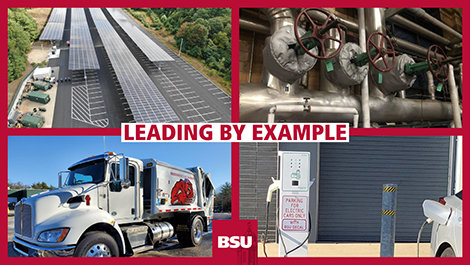
As the nation and commonwealth move toward carbon neutrality, it demonstrates how Bridgewater is moving in that direction. We’re leading the way as an example for other institutions in how things can be done to accomplish those goals.
Crimson and white are Bridgewater State University’s colors, but BSU is garnering state recognition for going green.
The university recently received a Leading by Example Award for its sustainability efforts that helped reduce greenhouse gas emissions 36 percent below 2004 levels. The annual awards recognize state agencies, municipalities, and individuals for their environmental commitment.
“It’s confirmation that we’re doing great work,” said Melinda Lamoureux, director of facilities management.
Most visibly, BSU installed a 1.3-megawatt solar canopy above Tower Lot that will generate electricity equivalent to the amount needed to power 195 homes. And more solar projects are planned.
"As the nation and commonwealth move toward carbon neutrality, it demonstrates how Bridgewater is moving in that direction,” said Mark Carmody, assistant vice president for operations. “We’re leading the way as an example for other institutions in how things can be done to accomplish those goals.”
Here is a look at several other ways BSU is reducing its environmental footprint.
Smaller and greener
A new trash collection truck stands out for more than the large bear graphics decorating its sides. With a state-of-the-art engine and other technology, it produces near zero emissions with reduced particle pollution (for example dust, dirt, and smoke) and smog-causing nitrous oxides.
BSU also cut the size of its fleet of cars and trucks from 84 vehicles in 2014 to 79. New additions are more fuel efficient than their replacements as BSU eliminates those with large V8 engines.
The university was also recently recognized for its participation in Recharge Massachusetts, an initiative to increase adoption of electric vehicles.
"We’re taking steps to look at the current fleet and analyze where and when we may move to electric vehicles,” said Stefanie Eaton, associate director of facilities management.
BSU is awaiting delivery of its first two plug-in hybrid vehicles that run on electricity and gasoline.
Charged Up
As electric cars become increasingly popular, Bridgewater is making it feasible for members of the campus community to drive gas-free. Existing stations next to Weygand Hall charge up to six cars at a time.
And, BSU received a $60,000 grant from Massachusetts’ Multi-Unit Dwelling and Educational Campus Charging Program. In the new year, the university expects to install new stations for public use by the Tinsley Center and the Mohler-Faria Science & Mathematics Center, creating charging options on both sides of campus.
Hidden Potential
While many sustainability projects are highly visible additions to campus, efforts behind the scenes also pay dividends financially and environmentally.
In the steam plant that provides heat and hot water to part of campus, crews insulated fittings in a project that paid for itself within a year. Separately, workers replaced about 300 steam traps across campus. Those devices ensure heat is used properly but allow steam to escape when they break. Both projects reduced fuel use and emissions.
BSU also upgraded mechanical equipment with more efficient models and installed new energy management hardware. Operations staff can make adjustments based on building occupancy; troubleshoot problems; and monitor temperature, carbon dioxide and relative humidity levels.
Do you have a BSU story you'd like to share? Email stories@bridgew.edu.